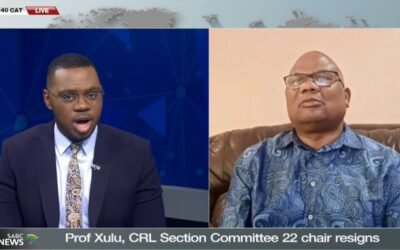Four UN Special Rapporteurs warn: the dissolution of the Unification Church and the anti-cult propaganda in schools violate international law.
by Massimo Introvigne

The United Nations has forcefully spoken out about the escalating discrimination against religious or belief minorities in Japan—a situation “Bitter Winter” has been denouncing consistently for the past three years. Their statement, issued on October 3, 2025, is a vindication of our reporting and a powerful call to conscience for Japan and its allies.
The four UN Special Rapporteurs—Nazila Ghanea (freedom of religion or belief), Nicolas Levrat (minority issues), Farida Shaheed (right to education), and Gina Romero (rights of children)—are among the most authoritative voices in the global human rights system. Their mandate is to investigate abuses, engage governments, and uphold the principles enshrined in international law, particularly the International Covenant on Civil and Political Rights (ICCPR).
The United Nations concern was triggered by the distribution of “Children’s Human Rights SOS Mini-Letters” to schoolchildren in Japan. While these pamphlets aimed to raise awareness about child abuse, they also—alarmingly—reinforced discriminatory stereotypes about religious minorities, including the Jehovah’s Witnesses.
“We are disappointed that materials disseminated to children in Japan reinforce discriminatory stereotypes about religion or belief minorities, and risk directly conflating legitimate religion and belief manifestations with child abuse,” the UN experts said.
The pamphlets draw on the “Q&A Guidelines” published by Japan’s Ministry of Health, Labour, and Welfare in December 2022. These guidelines were the subject of a United Nations statement in April 2024. However, the problematic framing persists.
“Rather than protecting children who belong to religion or belief minorities, these materials risk contributing to their bullying and marginalisation,” the United Nations document said.
“In line with our previous concerns, we have received credible reports that religion or belief minorities, including Jehovah’s Witnesses, have since found themselves under increased scrutiny from authorities even when engaging in legitimate religious activities in line with article 18 of the International Covenant on Civil and Political Rights, such as praying with children, or opting out of certain activities on religious grounds,” the experts added.
“We are concerned that the continued use and re-use of the Q&A Guidelines’ discriminatory framing reflects a broader pattern of targeting religion or belief minorities for surveillance and administrative harassment,” they said.
“While we appreciate and encourage sincere efforts to engage with children and young people in order to combat violence and abuse in the home and at school, such good faith efforts must not result in discrimination against minorities.”
The experts also addressed the Tokyo District Court’s March 2025 decision to dissolve the Family Federation for World Peace and Unification, formerly known as the Unification Church, currently under appeal. The ruling was based on civil tort judgments that invoked the vague concept of “public welfare.”
“The civil tort rulings on which the dissolution decision was based on relies on the violation of ‘social appropriateness’ which were deemed to constitute a serious harm to ‘public welfare’. As previously noted by the Human Rights Committee the concept of ‘public welfare’ is vague and open-ended and may permit restrictions exceeding those permissible under the ICCPR,” the United Nations document warned.
The statement emphasized that “any restrictions on the exercise of Article 18 rights must comply strictly with the limitations set out in Article 18.3 of the ICCPR, as interpreted by the UN Human Rights Committee.”
This is not just a legal technicality. It is a warning. Japan can no longer ignore the protests of the international community and continue with its violations of international law, expressed in its attempted dissolution of the Unification Church, and its limitations on the rights of parents to educate their children in their faiths.
And this warning extends beyond Japan. In South Korea, the government has intensified its crackdown on religious groups deemed hostile to the administration. The leader of the Unification Church, Mother Han, and prominent Christian Pastor Son Hyun-bo have been jailed, and other churches face increasing scrutiny. The campaign in South Korea and Japan is parallel and coordinated. The UN’s message is clear: religious freedom is not negotiable. Surveillance, harassment, and dissolution orders are not tools of justice—they are signs of democratic decay.
The statement by the UN experts is a long-overdue recognition of the suffering endured by religious minorities in East Asia. It is a celebration of truth, a defense of dignity, and a call to action.
Let us hope it is heard.

Massimo Introvigne (born June 14, 1955 in Rome) is an Italian sociologist of religions. He is the founder and managing director of the Center for Studies on New Religions (CESNUR), an international network of scholars who study new religious movements. Introvigne is the author of some 70 books and more than 100 articles in the field of sociology of religion. He was the main author of the Enciclopedia delle religioni in Italia (Encyclopedia of Religions in Italy). He is a member of the editorial board for the Interdisciplinary Journal of Research on Religion and of the executive board of University of California Press’ Nova Religio. From January 5 to December 31, 2011, he has served as the “Representative on combating racism, xenophobia and discrimination, with a special focus on discrimination against Christians and members of other religions” of the Organization for Security and Co-operation in Europe (OSCE). From 2012 to 2015 he served as chairperson of the Observatory of Religious Liberty, instituted by the Italian Ministry of Foreign Affairs in order to monitor problems of religious liberty on a worldwide scale.



